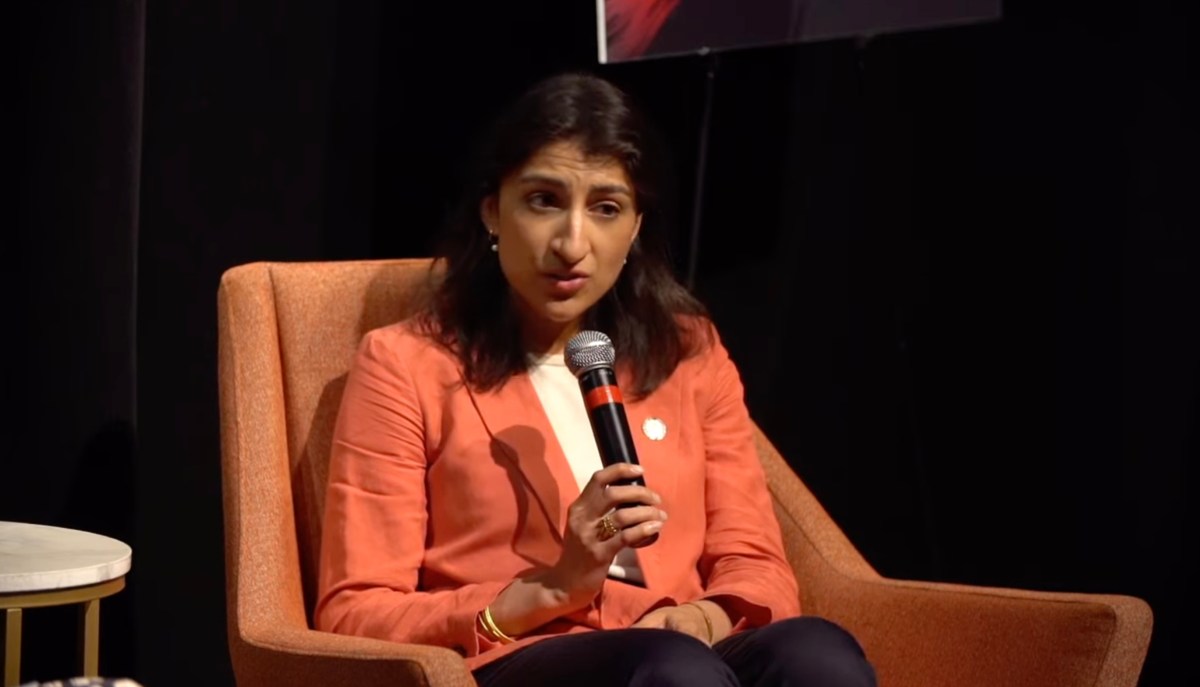The US Federal Trade Commission (FTC) will investigate all aspects of the rise of AI technology, FTC Chair Lina Khan said at TechCrunch’s StrictlyVC event in Washington, D.C., on Tuesday. But Khan said the commission’s goal is not to crush startups trying to compete in the space with increased regulation.
“We want to make sure that the arteries of commerce are open, the avenues of commerce are open, and that if you have a good idea and you can commercialize it — if there’s interest in the market — you have a fair chance to compete,” Khan told the audience. “Your fate depends on the strength of your idea and your business talent, not on whether you have some big corporation threatening to trample over you.”
Still, the FTC isn’t ignoring the technology or its potential harms — in fact, it’s already seeing an increase in consumer complaints in some areas, such as voice cloning scams, Kahn said.
This type of technology was recently highlighted by OpenAI’s release, then removal, of an audio for ChatGPT that resembled actress Scarlett Johansson, who famously voiced the AI in the film Her. The actress claimed that she had declined OpenAI’s offer to record her own voice for the chatbot, and so a clone of her was created instead (OpenAI claims they simply used a different voice actor).
When asked what areas of AI the FTC is overseeing, Khan explained that it’s all of them.
“We’re looking across the entire stack, from the chip to the cloud to the models to the downstream apps, trying to understand what’s going on at each layer,” she said. Additionally, the agency wants to hear from “people on the ground” about what they see as both opportunities and risks.
Of course, overseeing AI won’t be without challenges, despite the number of technologists the FTC has hired to help in this area. Khan said the agency received more than 600 applications from technologists seeking jobs at the agency, but she declined to say how many have actually been hired. But she said the agency has about 1,300 employees in total, 400 fewer than it did in the 1980s, despite the economy having grown 15-fold.
The department, which has dozens of antitrust cases and nearly 100 consumer protection cases on its roster, is turning to innovative tactics to fight fraud, especially in the AI space.
For example, Khan said that the agency Recent voice cloning challenges The FTC therefore invited the market and the public to submit ideas on how agencies like the FTC can better detect and monitor in real time whether calls or voices are genuine or whether voice clones are being used for fraudulent purposes. In addition to uncovering the best ideas from such a challenge, the FTC also hopes to encourage the market to focus on developing more mechanisms to combat AI fraud.
Another area the FTC is focusing on, Khan explained, is focusing on what openness really means in the context of AI. “How do we make sure that this isn’t just a branding attempt, but that it’s truly open when we look at the terms,” she asked, adding that the FTC wants to get ahead of some of the “open first, closed later” dynamics previously seen in the Web 2.0 era.
“I think in general there are a lot of lessons to be learned, but particularly now as we’re thinking about some of these AI tools I think this is really the right time to apply them,” Khan said.
Additionally, the bureau is poised to monitor whether the industry is engaging in AI hype, where the value of the products is inflated. “We believe that some of these AI tools are being used to inflate or exaggerate the value of what’s being offered, so we want to make sure that we’re monitoring that,” Khan noted. “There have already been some lawsuits about AI hype and false advertising, and we continue to scrutinize this area.”
